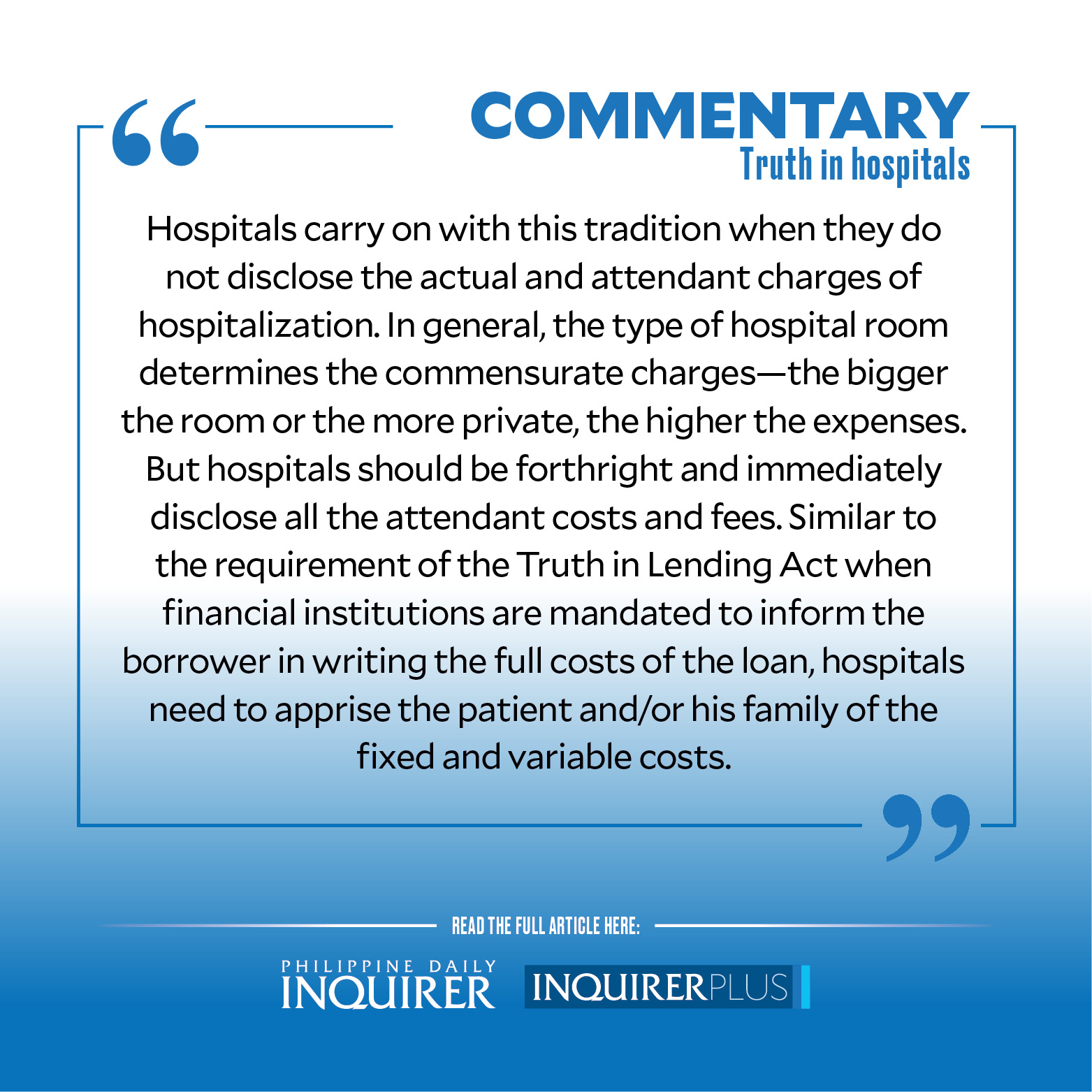
A few months ago, a family member was stricken with COVID-19. He was a senior with multiple comorbidities. From all indications, it was a death sentence.
He developed fever one weekend in March 2021. He was swabbed at home and the result was positive. Given his increasing debility, he was admitted to the hospital a day after.
It was early in the surge, so the family was able to choose the facility. Typically, it is where the family’s regular doctors hold clinic or where a relative works. The consideration is familiarity and the expected attention. Ideally, it is a quality tertiary hospital, fully equipped and competently staffed.
I can empathize with families who could not be accommodated in medical facilities, or patients who were treated in tents or died in parking lots. We pray for lives lost and for survivors suffering.
Although major medical expenses can quickly wipe out savings and incur crippling debt, costs and fees at the hospital were hardly discussed among the family. It may be due to our culture not to scrimp on money and in fact to spare no expense to preserve the well-being and save the life of a family member.
Hospitals carry on with this tradition when they do not disclose the actual and attendant charges of hospitalization. In general, the type of hospital room determines the commensurate charges—the bigger the room or the more private, the higher the expenses.
But hospitals should be forthright and immediately disclose all the attendant costs and fees. Similar to the requirement of the Truth in Lending Act when financial institutions are mandated to inform the borrower in writing the full costs of the loan, hospitals need to apprise the patient and/or his family of the fixed and variable costs.
Fixed costs include the room rates and their inclusions or exclusions, and daily consumables. Variable costs cover prescribed medicines and routine tests. Such disclosure will lessen unnecessary or repetitive tests. For example, instead of doing blood work three or four times a day, these can be combined to once a day at less pain and discomfort to the patient. The PPE expenses for each entry into a COVID-19-designated room are also consequently reduced.
Medical personnel cannot just constantly add on charges without informing the family. For practicality, a threshold can be set, say P1,000 a day, over which notification can be made via text or email.
For contingent expenses like procedures or drugs that may not be immediately known, there should at least be an outline of the treatment plan, the options and the estimated expenses. In COVID-19 cases, the treatments that include experimental drugs or allied procedures are prescribed without providing the costs.
Bill shock from hospitals is much worse than telco or Meralco billings. It is good practice for the family to regularly monitor the running total, particularly when there are key medical interventions.
Embedded in any hospital’s core mission is to reasonably charge to cover costs and margins. For this to happen, open or transparent pricing is essential. Hospitals must publish a list of the most common expenses and fees, especially those that are readily available at a fraction elsewhere, and to allow the family to provide the required items. Impositions made unilaterally can be a case of overcharging or over-recovery. Recall the tenets of the generics law, which seeks to provide quality medicine at a lower price, and the mandate of the Price Act to protect patients as consumers.
There is also the matter of access to patient’s records. By right, patient’s information, whether diagnostics or prescriptives, belongs to the individual. Medications and their dosage and provenance also need to be shared as a patient file.
Medical administrators and practitioners, wary of malpractice suits, keep and hold hospital records as if their lives depend on them. In reality, patients’ lives are at the mercy of the standard of care in hospitals and the due diligence of medical staff. The interplay between doctor-patient privilege and its extension to the family, the data privacy and consumer protection setting, and laws governing hospitals requires another story.
Truth in hospitals is necessary for healing to truly take center stage. Hospitals as innovators in health care can lead the way in engaging their primary stakeholders—the patients and their families. The afflicted must know and the dying informed. The living must prepare and advocate.
Postscript: Three weeks after and with near-death episodes, our family member survived with the care of his medical team, the prayers and support of the whole family, and by the grace of God.
——————
Geronimo L. Sy is a former assistant secretary of the Department of Justice. He set up the department’s Office of Cybercrime and Office for Competition.